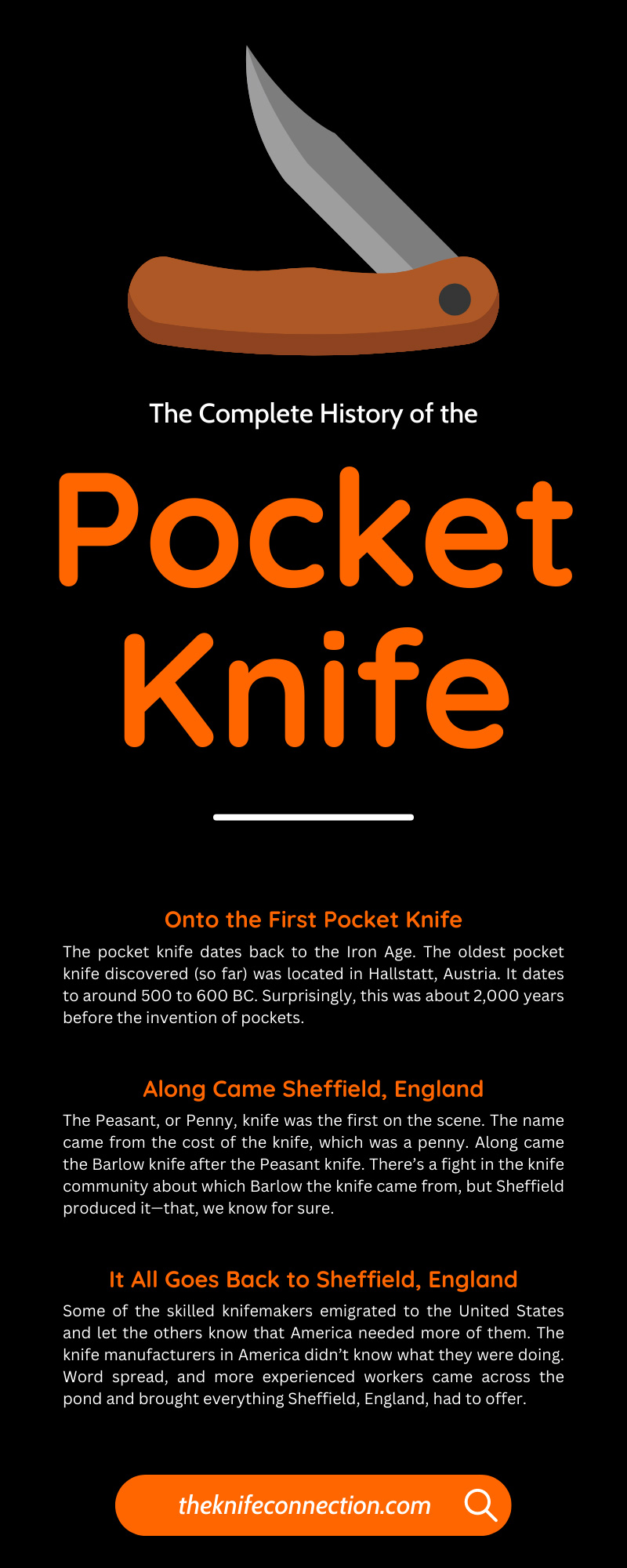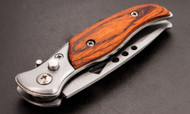The Complete History of the Pocket Knife
Jun 2 2023 - 9:57
A pocket knife is a crucial tool for many people. And we’re serious when we say crucial. You can use it to tackle every task, from opening a box to untangling wildlife. Not everyone appreciates carrying around a large pocket knife, but even small Swiss Army Knives can save you in a pickle. Everyone should be carrying some type of pocket knife with them.
Are you aware that the pocket knife has an interesting and rich history? Scientists discovered the first one, and it dates back to the BC years! And not too much has changed since the beginning. It’s truly incredible and interesting to read about. If you’re ready to know more, continue reading to discover the complete history of the pocket knife. It will make for interesting conversations at parties.
What Is a Pocket Knife?
A pocket knife is typically one or more blades safely folded into a handle so the user can carry the knife easily and securely. Some people may know this as a jackknife. The only difference is that jackknives are larger pocket knives.
Importance of Pocket Knives
Always having a pocket knife on hand is an easy way to ensure you have the right tool for the job. Many people carry them in their pockets, hence the name. You can easily cut a string from your shirt, clip the fishing line to the right length, remove small branches from the hiking path, gather tinder, or open a box.
The pocket knife is a knife and sheath all in one. The folding mechanism becomes the sheath. It makes it easy to carry inside bags, purses, or pouches without worry. Ranchers, farmers, fishers, and outdoor adventurers had their worlds change when this knife busted onto the knife scene.
Onto the First Pocket Knife
Have you ever wondered when the pocket knife was invented? Well, today is your lucky day because you get to find out. The pocket knife dates back to the Iron Age. The oldest pocket knife discovered (so far) was located in Hallstatt, Austria. It dates to around 500 to 600 BC. Surprisingly, this was about 2,000 years before the invention of pockets. Of course, it wouldn’t have been called a pocket knife at that time. Because of how it folded and the similarities between that first knife and the modern pocket knife, scientists determined what it was.
What were the features of this first pocket knife? It featured a bone handle that many salt miners and villagers likely used. Have scientists found similar knives in other areas? Yes! In fact, the Roman military used a close replica, and so did the Vikings.
The pocket knife design has withstood the test of time. The general concept has remained the same with minor updates due to better technology and materials.
Along Came Sheffield, England
Changes in manufacturing practices made pocket knives available to the public. They were affordable to everyone, thanks to Sheffield, England. The conditions were ideal for this location to succeed at mass-producing the pocket knife. The hills contained massive amounts of iron and coal, and the several area rivers provided power to the plants. Fun fact: Sheffield, England, was the location where stainless steel was invented.
The Peasant, or Penny, knife was the first on the scene. The name came from the cost of the knife, which was a penny. Along came the Barlow knife after the Peasant knife. There’s a fight in the knife community about which Barlow the knife came from, but Sheffield produced it—that, we know for sure.
Most men in the 1700s and 1800s owned a Barlow knife. Even Abraham Lincoln and George Washington had them! Those are big names in the history of the United States. If George Washington was cool enough to carry one, then everyone else was too. Everybody who was anybody wanted a Barlow knife. Mark Twain was incredibly fond of this knife. He even included it in The Adventures of Huckleberry Finn. Now that’s commitment. This timeless design is still popular today among knife enthusiasts.
It All Goes Back to Sheffield, England
America began making its version of the beloved Barlow knife, but Sheffield, England, revolutionized the knife-making industry. During the Chartist Uprising from 1838 to 1848, over a hundred thousand expert knifemakers in Sheffield, England, couldn’t vote. In fact, nobody in the working class was allowed to vote during this time, and this rule made them angry. People petitioned, rebelled, and got arrested to make their voices heard. The sentences were typically hard labor, and those sentenced were sent away from their families to Australia. The government wouldn’t consider the petitions even though millions signed them demanding equal treatment.
Some of the skilled knifemakers emigrated to the United States and let the others know that America needed more of them. The knife manufacturers in America didn’t know what they were doing. Word spread, and more experienced workers came across the pond and brought everything Sheffield, England, had to offer. They set up shop in Waterbury, Connecticut, and beyond.
Modern Pocket Knife Innovations
The steel mills in Sheffield, England, sit quiet, but that doesn’t mean the knife industry isn’t growing and innovating. Knifemakers have been perfecting their craft ever since. They play around with features, ideas, and designs to ensure they’re putting the best knife on the market. Manufacturers understand customers want a knife that will last them for years.
When you purchase a pocket knife, you have to be in love with it. It should be a high-quality knife that feels good in your hand and isn’t too bulky. The features should fit your specific needs. There’s truly a pocket knife for every occasion and situation. It’s a tool that has stood the test of time and will stick around for years to come.
Now that you understand the complete history of the pocket knife, it’s time to do some knife shopping. The Knife Connection carries incredible high-quality knives that every knife enthusiast will love. You’ll find premium knife accessories, handles, and cleaning supplies to keep your knife looking sharp. Don’t forget to shop around our online store to find the perfect blade and handle for you.

